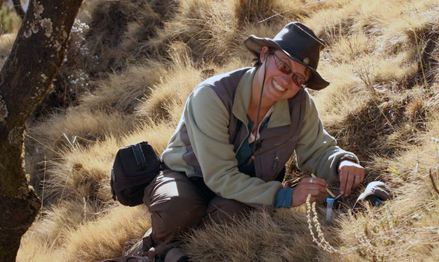Latest News Archive
Please select Category, Year, and then Month to display items
05 June 2018
Photo Supplied
 Archaeological excavations in the Wonderwerk Cave, north of Kuruman in the Northern Cape.
Archaeological excavations in the Wonderwerk Cave, north of Kuruman in the Northern Cape.
Research fellow Dr Lloyd Rossouw from the Department of Plant Sciences at the University of the Free State (UFS) recently published an article in the Nature Ecology and Evolution journal with Dr Michaela Ecker from the University of Toronto as lead author, and Dr James Brink, research fellow at the UFS Centre for Environmental Management. The findings described in “The palaeoecological context of the Oldowan-Acheulean in southern Africa” provides the first extensive paleoenvironmental sequence for the interior of southern Africa by applying a combination of methods for environmental reconstruction at Wonderwerk Cave, which have yielded multiple evidence of early human occupation dating back almost two million years ago.
Where water once was
The Wonderwerk Cave is found north of the Kuruman hills (situated in Northern Cape) a 140m long tube with a low ceiling. The surroundings are harsh. Semi-arid conditions allow for the survival of only hardy bushes, trees, and grasses. But during the Early Pleistocene, stepping out of the Wonderwerk Cave you would have been greeted by a completely different site, the researchers found. Using carbon and oxygen stable isotope analysis on the teeth of herbivores (Dr Ecker), fossil faunal abundance (Dr Brink), as well as the analysis of microscopic plant silica remains (phytoliths) excavated from fossil soils inside the cave (Dr Rossouw), the results show that ancient environments in the central interior of southern Africa were significantly wetter and housed a plant community unlike any other in the modern African savanna.
What difference does it make?
While East African research shows increasing aridity and the spread of summer-rainfall grasslands more than a million years ago, the results from this study indicate an interesting twist. During the same period, shifts in rainfall seasonality allowed for alternating summer and winter-rainfall grass occurrences coupled with prolonged wetlands, that remained major components of Early Pleistocene (more or less the period between one and two million years ago) environments in the central interior of southern Africa. That means our human ancestors were also living and evolving in environments other than the generally accepted open, arid grassland model.
Vice-Chancellor’s Award for Excellence in Teaching goes to trailblazer Dr Aliza le Roux
2013-11-15
|
 |
Dr Aliza le Roux
Photo: Supplied
15 November 2013 |
Dr Aliza le Roux, Subject Head in the Department of Zoology and Entomology at the UFS Qwaqwa Campus, is this year’s winner of the Vice-Chancellor’s Award for Excellence in Teaching.
It came as no surprise. Dr le Roux has already been piling up numerous awards as a result of her outstanding work as an academic who is also an NRF-rated researcher.
In 2012, she joined the Teaching and Learning Champions group, which inspired her to take a more scholarly, research-focused approach to her teaching. Dr Le Roux has had huge successes in her teaching at the Qwaqwa Campus, propelling student pass rates from less than 50% to more than 90% in one course. As part of her approach, she makes use of interventions such as pre-class quizzes on Blackboard.
She is also doing Action Research on the teaching method known as ‘flipping’ the classroom, a process that essentially reversed traditional teaching practice. Dr le Roux is also looking into the impact of introducing Zotero (a free user-friendly online tool for research purposes) on the Qwaqwa Campus.
Her primary research outside of the classroom focuses on the evolution of wild mammals’ cognitive abilities. Dr le Roux and her students are starting fieldwork in November this year, investigating how paternal care impacts bat-eared foxes’ physical and cognitive development.